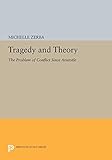Tragedy and Theory : The Problem of Conflict Since Aristotle / Michelle Zerba.
Material type: TextSeries: Princeton Legacy Library ; 900Publisher: Princeton, NJ : Princeton University Press, [2014]Copyright date: ©1988Edition: Course BookDescription: 1 online resource (314 p.)Content type:
TextSeries: Princeton Legacy Library ; 900Publisher: Princeton, NJ : Princeton University Press, [2014]Copyright date: ©1988Edition: Course BookDescription: 1 online resource (314 p.)Content type: - 9780691603247
- 9781400859382
- Conflict (Psychology) in literature
- Tragedy
- LITERARY CRITICISM / Semiotics & Theory
- Aeschylus
- Aesthetic Theory
- Anguish
- Antinomy
- Antithesis
- Appeal to emotion
- Aristotle
- Ars Poetica (Horace)
- Averroes
- Bussy D'Ambois
- Catharsis
- Characters of Shakespear's Plays
- Classical unities
- Classicism
- Closed circle
- Coluccio Salutati
- Consciousness
- Contemptus mundi
- Critical theory
- Criticism
- Critique
- Decorum
- Deontological ethics
- Dialectic
- Disputation
- Dissoi logoi
- Divine law
- Dramatic theory
- Ethical dilemma
- Euripides
- Existentialism
- Externality
- Francis Fergusson
- Good and evil
- Greek tragedy
- Hamartia
- Hannah Arendt
- Hedonism
- Hegelianism
- Hubris
- Intentionality
- Irony
- Irrational Man
- Irrationality
- Jacques Derrida
- Jean Hyppolite
- Karl Jaspers
- King Lear
- Literary criticism
- Literary theory
- Lodovico Castelvetro
- Mental space
- Mimesis
- Moral absolutism
- Moral realism
- Morality
- Myth
- New Thought
- Nicomachean Ethics
- On Truth
- Pathos
- Philosopher
- Philosophy
- Pity
- Platitude
- Plautus
- Poetics (Aristotle)
- Poetry
- Polonius
- Pre-Socratic philosophy
- Prohairesis
- Quintilian
- Rationality
- Renaissance tragedy
- Republic (Plato)
- Revenge tragedy
- Rhetoric
- Romanticism
- Satire
- Scholasticism
- Shakespearean tragedy
- Sophocles
- Stephen Greenblatt
- Suffering
- Superiority (short story)
- Søren Kierkegaard
- Teleology
- The Birth of Tragedy
- The Marriage of Heaven and Hell
- The Philosopher
- Theodicy
- Theory
- Thomas Kyd
- Thought
- Tragedy
- Tragic hero
- Verisimilitude
- W. D. Ross
- William Prynne
- William Shakespeare
- 809.2/512 19
- PN1892
- online - DeGruyter
| Item type | Current library | Call number | URL | Status | Notes | Barcode | |
|---|---|---|---|---|---|---|---|
 eBook
eBook
|
Biblioteca "Angelicum" Pont. Univ. S.Tommaso d'Aquino Nuvola online | online - DeGruyter (Browse shelf(Opens below)) | Online access | Not for loan (Accesso limitato) | Accesso per gli utenti autorizzati / Access for authorized users | (dgr)9781400859382 |
Frontmatter -- Contents -- Preface -- Acknowledgments -- Note on Translations -- Introduction -- Chapter One. Hegel: Conflict And Order -- Chapter Two. Aristotle: Conflict and Disorder -- Chapter Three. Renaissance And Neoclassical Dramatic Theory: Conflict and Didacticism -- Chapter Four. Kant and Schiller: Conflict and the Sublime -- Bibliography -- Index
restricted access online access with authorization star
http://purl.org/coar/access_right/c_16ec
Michelle Zerba engages current debates about the relationship between literature and theory by analyzing responses of theorists in the Western tradition to tragic conflict. Isolating the centrality of conflict in twentieth-century definitions of tragedy, Professor Zerba discusses the efforts of modern critics to locate in Aristotle's Poetics the origins of this focus on agon. Through a study of ethical and political ideas formative of the Poetics, she demonstrates why Aristotle and his Renaissance and Neoclassical beneficiaries exclude conflict from their accounts of tragedy. The agonistic element, the book argues, first emerges in dramatic criticism in nineteenth-century Romantic theories of the sublime and, more influentially, in Hegel's lectures on drama and history.This turning point in the history of speculation about tragedy is examined with attention to a dynamic between the systematic aims of theory and the subversive conflicts of tragic plays. In readings of various Classical and Renaissance dramatists, Professor Zerba reveals that strife in tragedy undermines expectations of coherence, closure, and moral stability, on which theory bases its principles of dramatic order. From Aristotle to Hegel, the philosophical interest in securing these principles determines attitudes toward conflict.Originally published in 1988.The Princeton Legacy Library uses the latest print-on-demand technology to again make available previously out-of-print books from the distinguished backlist of Princeton University Press. These editions preserve the original texts of these important books while presenting them in durable paperback and hardcover editions. The goal of the Princeton Legacy Library is to vastly increase access to the rich scholarly heritage found in the thousands of books published by Princeton University Press since its founding in 1905.
Mode of access: Internet via World Wide Web.
In English.
Description based on online resource; title from PDF title page (publisher's Web site, viewed 27. Jan 2023)


